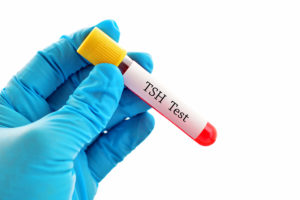Why Your Doc Misses the Hypothyroidism Diagnosis
January is Thyroid Awareness Month. One of the things we hear often from our guests is that they have all the symptoms of low thyroid function, but are told by their doctor that nothing is wrong. This makes the patient feel like it is “all in their head.” If this sounds like you, read on.
You’ve not been feeling well, and after researching all your symptoms, you are convinced you have hypothyroidism. You’ve discovered that the fatigue, sleepless nights, unexplained weight gain, depressed moods, hair loss and cold hands are all classic symptoms of low thyroid function. Now you’re feeling hopeful, and you can’t wait to see your doctor and finally get a diagnosis of low thyroid function so you can start treatment and get to feeling better.
But when you finally see your doctor, he tells you that your blood work is normal and that there is nothing wrong with you. How could this be? What are you supposed to do now?
More than thirteen million Americans may be suffering unknowingly from hypothyroidism. This means that thirteen million people are needlessly suffering with symptoms like extreme fatigue, migraines, insomnia, depression, hair loss, constipation, joint pain, muscle aches and weight gain among many others. This also means that there are thirteen million frustrated Americans.
You would think that with the advances in modern medicine we would be getting this right by now. We can diagnose and monitor an astronaut’s health condition in space, yet thirteen million Americans physically walk into their doctor’s office with symptoms of low thyroid function, are given a blood test that is proclaimed “normal” and rather than leave with a therapeutic trial of natural thyroid, and they are given a prescription for an antidepressant or sleep aid to treat their symptoms, not the underlying problem.
Why aren’t docs getting it? This is a case of relying solely on the advances of modern science and dismissing good, old-fashioned, common sense medicine. A patient has become a number and the results of a lab test. By diagnosing based on blood tests alone, doctors are forgetting a very important piece of the puzzle: You.
TSH Blood Test Fails to Diagnose Many Patients
 Rather than looking at the patient and their symptoms as a whole, conventional doctors rely on the TSH blood test, which has a lab range as wide as the Grand Canyon and as tall as the Empire State Building and measures the level of thyroid stimulating hormone in the blood. Contrary to what you might think, the TSH is NOT a measure of how much thyroid hormone the thyroid gland produces, but rather a measure of how much thyroid stimulating hormone is produced by the pituitary gland.
Rather than looking at the patient and their symptoms as a whole, conventional doctors rely on the TSH blood test, which has a lab range as wide as the Grand Canyon and as tall as the Empire State Building and measures the level of thyroid stimulating hormone in the blood. Contrary to what you might think, the TSH is NOT a measure of how much thyroid hormone the thyroid gland produces, but rather a measure of how much thyroid stimulating hormone is produced by the pituitary gland.
In order to boost thyroid hormone production, the pituitary gland produces more TSH when the thyroid gland is not producing enough thyroid hormone. Conversely, the pituitary secretes less TSH when the thyroid gland is producing more or too much thyroid in order to slow down thyroid hormone production. Think of the TSH as your thermostat. If it feels like 70 degrees in a room and the thermostat is set on 70 degrees, then everything is fine and dandy in your world. However, if the thermostat is set on 70 degrees, yet there is ice on the windows and your breath is making steam then it would be a safe assumption that something is wrong with the thermostat itself and it is not accurately measuring the temperature of the room. If you have all the symptoms of hypothyroidism, yet your blood tests are normal, there’s a good chance that something’s wrong with your thermostat.
Type 2 Hypothyroidism is Not on Conventional Doctors’ Radar
Another problem is that conventional doctors assume every bit of the thyroid hormone in the blood is getting into your cells properly. This would be a correct assumption if we lived in a perfect world. Think of it this way, imagine firewood neatly stacked on the hearth next to the fireplace. It’s there and it’s ready, but if someone doesn’t pick it up and put it into the fireplace where there is a flame, then it won’t burn. This is the same way that thyroid hormone works. You can have an adequate amount of thyroid hormone in your blood resulting in picture perfect lab results, but if it’s not actually assimilated into your cells, you’re not getting any of its benefits. If your thyroid hormones are not properly used at the cellular level, you can experience the symptoms of hypothyroidism. This is called Type 2 Hypothyroidism.
There are no blood tests to determine if you have depression, anxiety, or if you’re not sleeping, etc. Doctors will easily hand out drugs such as antibiotics, antidepressants, sleep or anti-anxiety medications among numerous others without a blood test. Yet they won’t even consider giving you something natural like a therapeutic trial of bioidentical thyroid to relieve your obviously low thyroid symptoms.
Here are 5 ways a doctor can properly diagnose hypothyroidism:
1. Determine the clinical symptoms by listening to the patient.
Symptoms of hypothyroidism include low energy, weakness, difficulty losing weight, cold sensitivity, decreased mental sharpness, brain fog, sluggish speech, sluggish bowel function, depression, mood swings, anxiety attacks, joint and muscle pain, headaches, migraines, tingling of hands and feet, recurrent infections, and shortness of breath.
2. Determine the physical signs which are the findings a doctor discovers upon physical examination.
Physical signs of hypothyroidism include low body temperature below 98.6, hair loss, coarse hair, loss of lateral third of eyebrows, enlarged tongue, puffy, swelling in face, pasty skin, loss of body hair, ridges in fingernails, overweight, cold hands and feet, elevated blood pressure, and elevated cholesterol.
3. Determine body temperature.
A low body temperature below 98.6 indicates hypothyroidism.
4. Obtain a good family history.
Hypothyroidism runs in families. Since it is hereditary, it is important to let your doctor know if your parents or siblings have been diagnosed with hypothyroidism.
5. Test for Hashimoto’s Thyroiditis.
Also known as autoimmune thyroiditis, Hashimoto’s is when your body makes antibodies against your thyroid gland. In this case, a doctor should check your blood work for two thyroid antibodies, thyroid peroxidase antibodies (TPOAB) and antithyroglobulin antibodies (ATA), however most conventional doctors don’t.
It’s Time to Stop Suffering from Undiagnosed Hypothyroidism
If you have symptoms of low thyroid function, don’t let yourself continue to be one of the thirteen million Americans suffering with undiagnosed hypothyroidism. Remember that just because your doctor wears a white coat, doesn’t mean he or she has all the answers. Maybe it’s time to get a second opinion from someone who sees you as something more than the results of a blood test.
Symptom Checker
Are you wondering if your symptoms could be caused by hypothyroidism? Take our symptom checker to find out. If you are ready to get your energy and zest for life back, call our Wellness Coaches today at 281-698-8698 for a complimentary wellness consultation.
Related Content
How Diet Affects Thyroid Function
Thyroid and Fluoride: Is Your Toothpaste Killing Your Thyroid?
Is Hypothyroidism the Cause of Your Depression?


Trina Kozak
I’m desperate for answers !…. Please help either via phone or email 559 392 5978 or Oneteam4god@yahoo.com thank you !
Hotze Team
Dear Trina,
We will have a wellness consultant contact you. Thank you for reaching out!
To your health,
Hotze Team
Deborah
I’m also desperate for answers my italia82872@yahoo.com or 401569-3023 thanks
Hotze Team
Dear Deborah,
Thank you for your comment. We will have a wellness consultant contact you to set up a complimentary wellness consultation. Please don’t lose hope, by restoring and balancing your hormones, you can resolve your symptoms of hormone imbalance and low thyroid function and feel good again.
To your health,
Hotze Team
Mandie
Is there some type of database that shows doctors in a patient’s area that are sympathetic towards these issues? I have been to four different doctors who all give me the same answer. They test my blood and it comes back normal, so I must be a hypochondriac, or I just need to get off the couch and stop eating fast food. The thing is I eat as healthy as I possibly can and I’m very active. But doctors seem to think I’m just looking for some quick fix to being overweight, when in reality the 50 or more other symptoms I’m experiencing matter wat more to me than my weight. I’m about to give up!
Christina Caugherty
I feel exactly the same way. You hit the nail on the head! Tired of being told everything is fine while im in pain every day and losing my hair in the process. Being told to go see a dermatologist! Nobody giving me answers!
Christina Caugherty
I feel exactly the same way. You hit the nail on the head! Tired of being told everything is fine while im in pain every day and losing my hair in the process. Being told to go see a dermatologist! Nobody giving me answers!
Hotze Team
Dear Christina,
We’re so sorry that you aren’t getting the right answers. Hair loss is a common symptom of hypothyroidism. Please take our symptom checker: http://makeshift-worm.flywheelsites.com/symptom-checker/
Here is an article that may be helpful: http://makeshift-worm.flywheelsites.com/2018/10/20-ways-hypothyroidism-affects-your-hair-skin-and-nails/
Please call our Wellness Consultants for a complimentary wellness consultation at 281-698-8698. Our doctors have great success in treating women with hormone imbalance and hypothyroidism. It would be our privilege to help you.
To your health,
Hotze Team